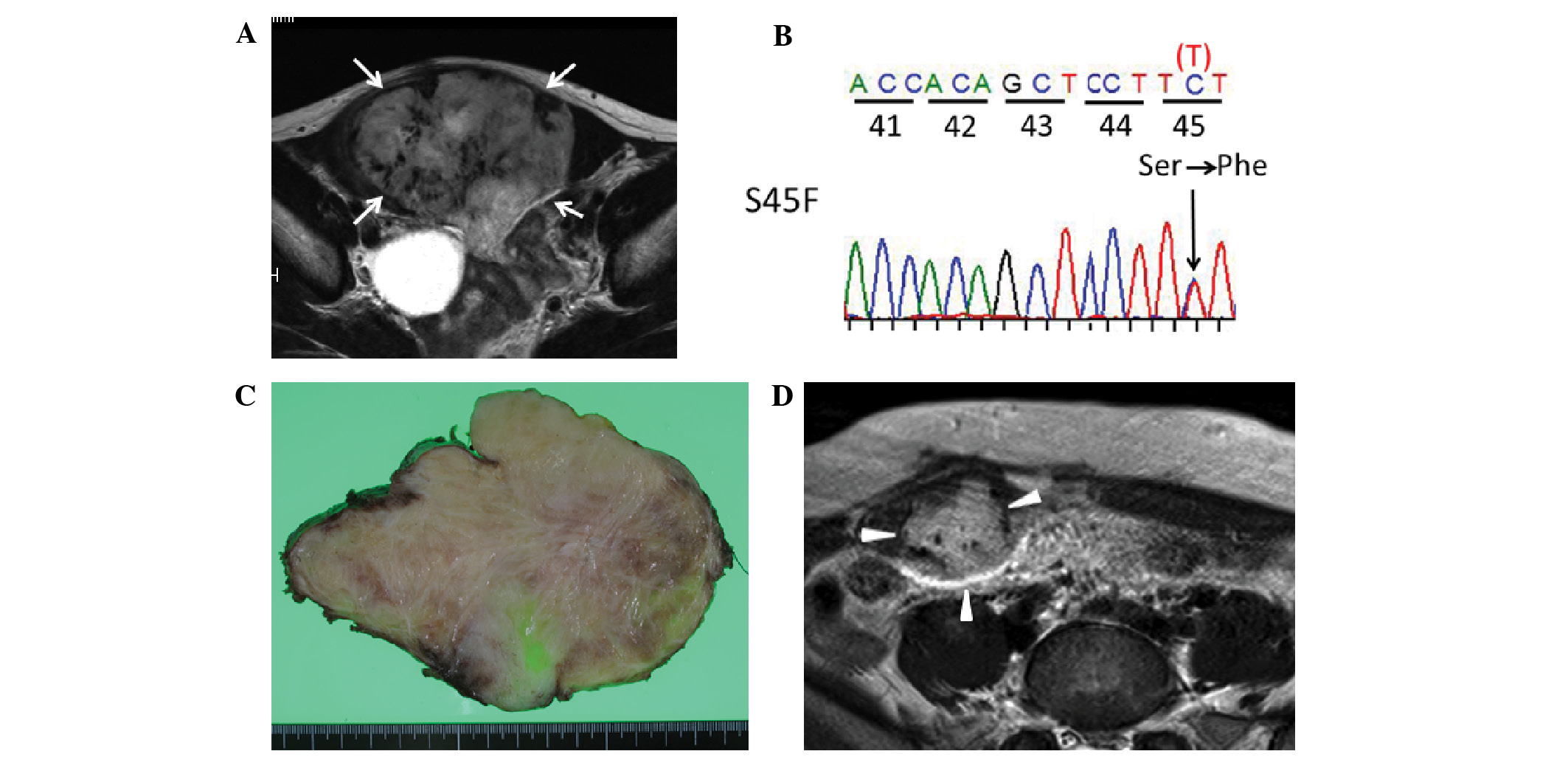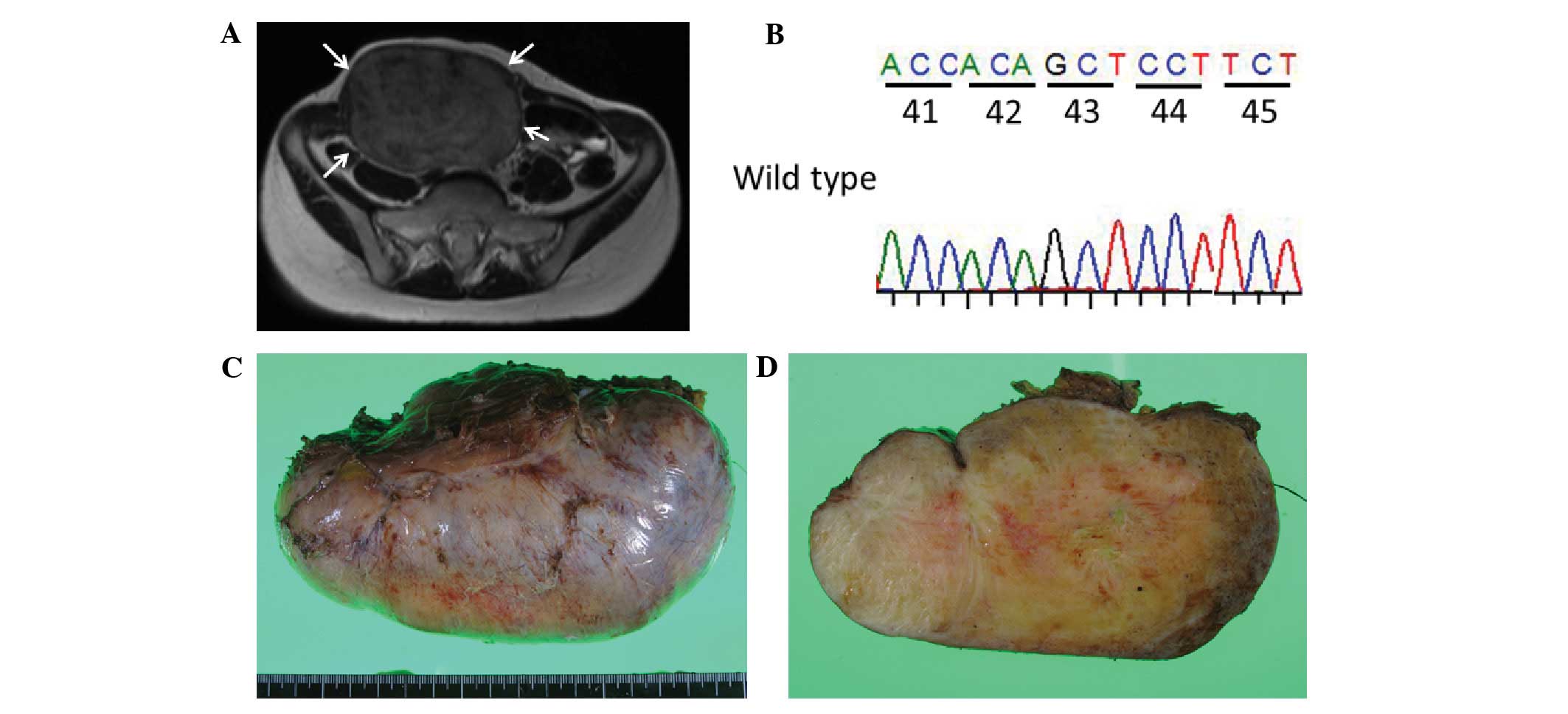|
1
|
Reitamo JJ, Scheinin TM and Häyry P: The
desmoid syndrome. New aspects in the cause, pathogenesis and
treatment of the desmoid tumor. Am J Surg. 151:230–237. 1986.
View Article : Google Scholar : PubMed/NCBI
|
|
2
|
Ballo MT, Zagars GK, Pollack A, Pisters PW
and Pollack RA: Desmoid tumor: Prognostic factors and outcome after
surgery, radiation therapy, or combined surgery and radiation
therapy. J Clin Oncol. 17:158–167. 1999.PubMed/NCBI
|
|
3
|
Gronchi A, Casali PG, Mariani L, Lo Vullo
S, Colecchia M, Lozza L, Bertulli R, Fiore M, Olmi P, Santinami M
and Rosai J: Quality of surgery and outcome in extra-abdominal
aggressive fibromatosis: A series of patients surgically treated at
a single institution. J Clin Oncol. 21:1390–1397. 2003. View Article : Google Scholar : PubMed/NCBI
|
|
4
|
Huang K, Fu H, Shi YQ, Zhou Y and Du CY:
Prognostic factors for extra-abdominal and abdominal wall desmoids:
A 20-year experience at a single institution. J Surg Oncol.
100:563–569. 2009. View Article : Google Scholar : PubMed/NCBI
|
|
5
|
Lev D, Kotilingam D, Wei C, Ballo MT,
Zagars GK, Pisters PW, Lazar AA, Patel SR, Benjamin RS and Pollock
RE: Optimizing treatment of desmoid tumors. J Clin Oncol.
25:1785–1791. 2007. View Article : Google Scholar : PubMed/NCBI
|
|
6
|
Merchant NB, Lewis JJ, Woodruff JM, Leung
DH and Brennan MF: Extremity and trunk desmoid tumors: A
multifactorial analysis of outcome. Cancer. 86:2045–2052. 1999.
View Article : Google Scholar : PubMed/NCBI
|
|
7
|
Nuyttens JJ, Rust PF, Thomas CR Jr and
Turrisi AT III: Surgery versus radiation therapy for patients with
aggressive fibromatosis or desmoid tumors: A comparative review of
22 articles. Cancer. 88:1517–1523. 2000. View Article : Google Scholar : PubMed/NCBI
|
|
8
|
Salas S, Dufresne A, Bui B, Blay JY,
Terrier P, Ranchere-Vince D, Bonvalot S, Stoeckle E, Guillou L, Le
Cesne A, et al: Prognostic factors influencing progression-free
survival determined from a series of sporadic desmoid tumors: A
wait-and-see policy according to tumor presentation. J Clin Oncol.
29:3553–3558. 2011. View Article : Google Scholar : PubMed/NCBI
|
|
9
|
Shido Y, Nishida Y, Nakashima H, Katagiri
H, Sugiura H, Yamada Y and Ishiguro N: Surgical treatment for local
control of extremity and trunk desmoid tumors. Arch Orthop Trauma
Surg. 129:929–933. 2009. View Article : Google Scholar : PubMed/NCBI
|
|
10
|
Colombo C, Miceli R, Lazar AJ, Perrone F,
Pollock RE, Le Cesne A, Hartgrink HH, Cleton-Jansen AM, Domont J,
Bovée JV, et al: CTNNB1 45F mutation is a molecular prognosticator
of increased postoperative primary desmoid tumor recurrence: An
independent, multicenter validation study. Cancer. 119:3696–3702.
2013. View Article : Google Scholar : PubMed/NCBI
|
|
11
|
Lazar AJ, Tuvin D, Hajibashi S, Habeeb S,
Bolshakov S, Mayordomo-Aranda E, Warneke CL, Lopez-Terrada D,
Pollock RE and Lev D: Specific mutations in the beta-catenin gene
(CTNNB1) correlate with local recurrence in sporadic desmoid
tumors. Am J Pathol. 173:1518–1527. 2008. View Article : Google Scholar : PubMed/NCBI
|
|
12
|
Mullen JT, DeLaney TF, Rosenberg AE, Le L,
Iafrate AJ, Kobayashi W, Szymonifka J, Yeap BY, Chen YL, Harmon DC,
et al: β-Catenin mutation status and outcomes in sporadic desmoid
tumors. Oncologist. 18:1043–1049. 2013. View Article : Google Scholar : PubMed/NCBI
|
|
13
|
Nishida Y, Tsukushi S, Shido Y, Urakawa H,
Arai E and Ishiguro N: Transition of treatment for patients with
extra-abdominal desmoid tumors: Nagoya university modality. Cancers
(Basel). 4:88–99. 2012. View Article : Google Scholar : PubMed/NCBI
|
|
14
|
Nishida Y, Tsukushi S, Shido Y, Wasa J,
Ishiguro N and Yamada Y: Successful treatment with meloxicam, a
cyclooxygenase-2 inhibitor, of patients with extra-abdominal
desmoid tumors: A pilot study. J Clin Oncol. 28:e107–e109. 2010.
View Article : Google Scholar : PubMed/NCBI
|
|
15
|
Hamada S, Futamura N, Ikuta K, Urakawa H,
Kozawa E, Ishiguro N and Nishida Y: CTNNB1 S45F mutation predicts
poor efficacy of meloxicam treatment for desmoid tumors: A pilot
study. PLoS One. 9:e963912014. View Article : Google Scholar : PubMed/NCBI
|
|
16
|
Poon R, Smits R, Li C, Jagmohan-Changur S,
Kong M, Cheon S, Yu C, Fodde R and Alman BA: Cyclooxygenase-two
(COX-2) modulates proliferation in aggressive fibromatosis (desmoid
tumor). Oncogene. 20:451–460. 2001. View Article : Google Scholar : PubMed/NCBI
|
|
17
|
Nishida Y, Tsukushi S, Urakawa H, Arai E
and Ishiguro N: Is it possible to identify clinically useful
prognostic groups for patients with desmoid tumors? J Clin Oncol.
30:1390author reply 1391. 2012. View Article : Google Scholar : PubMed/NCBI
|
|
18
|
Hamada S, Urakawa H, Kozawa E, Futamura N,
Ikuta K, Shimoyama Y, Nakamura S, Ishiguro N and Nishida Y: Nuclear
expression of β-catenin predicts the efficacy of meloxicam
treatment for patients with sporadic desmoid tumors. Tumour Biol.
35:4561–4566. 2014. View Article : Google Scholar : PubMed/NCBI
|
|
19
|
Bo N, Wang D, Wu B, Chen L and Ruixue Ma:
Analysis of β-catenin expression and exon 3 mutations in pediatric
sporadic aggressive fibromatosis. Pediatr Dev Pathol. 15:173–178.
2012. View Article : Google Scholar : PubMed/NCBI
|
|
20
|
Dômont J, Salas S, Lacroix L, Brouste V,
Saulnier P, Terrier P, Ranchère D, Neuville A, Leroux A, Guillou L,
et al: High frequency of beta-catenin heterozygous mutations in
extra-abdominal fibromatosis: A potential molecular tool for
disease management. Br J Cancer. 102:1032–1036. 2010. View Article : Google Scholar : PubMed/NCBI
|
|
21
|
Huss S, Nehles J, Binot E, Wardelmann E,
Mittler J, Kleine MA, Künstlinger H, Hartmann W, Hohenberger P,
Merkelbach-Bruse S, et al: β-catenin (CTNNB1) mutations and
clinicopathological features of mesenteric desmoid-type
fibromatosis. Histopathology. 62:294–304. 2013. View Article : Google Scholar : PubMed/NCBI
|
|
22
|
Le Guellec S, Soubeyran I, Rochaix P,
Filleron T, Neuville A, Hostein I and Coindre JM: CTNNB1 mutation
analysis is a useful tool for the diagnosis of desmoid tumors: A
study of 260 desmoid tumors and 191 potential morphologic mimics.
Mod Pathol. 25:1551–1558. 2012. View Article : Google Scholar : PubMed/NCBI
|
















